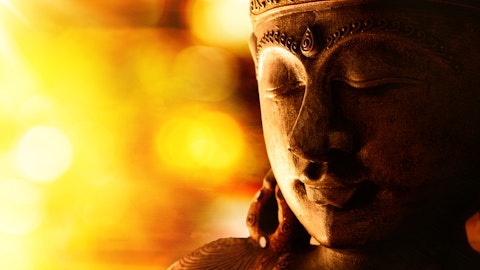In this article, we will take a look at the 25 most religious states in the US. If you would like to skip our discussion on the religious landscape of the US, you can go to the 5 Most Religious States in the US.
A Pew Research Center survey released in January 2024 revealed that 28% of American adults claim no religious affiliation, marking a 12-percentage point increase since 2007. Millennials are driving this increase in non-affiliation. Furthermore, there’s been a notable rise in the number of individuals praying less frequently, with 32% of survey respondents in 2021 stating they rarely or never pray, an 18% increase from 2007. These trends reflect the declining religiousity of American society.
However, despite the rise in non-affiliation, a majority of respondents still express belief in a higher power or God while having negative sentiments towards organized religion. Those identifying as “nones” or labeling themselves as atheists or agnostics are not necessarily opposed to religion and acknowledge its potential benefits. This trend is concerning, given the widespread belief among Americans that the nation was intended to be Christian by its founding fathers.
According to a 2022 study, 45% of adults believe the US should be a Christian nation, while 33% perceive it as already being one. Many Americans perceive the decline of religion as a negative trend, as individuals with no religious affiliations tend to participate less in voting, volunteering, and public affairs compared to those affiliated with a religion. Interestingly, despite this sentiment, 77% of US adults surveyed by Pew believe that religious institutions such as churches should refrain from supporting individuals running for public office, while 67% feel that these institutions should not be involved in political matters altogether.
This perspective is interesting considering the declining church attendance and the 12% decrease in the percentage of people who prioritize religion in their lives over a span of thirty years, from 1992 to 2022. Even in traditionally religious states across America, there has been a decline in church and synagogue attendance. According to Gallup, twenty years ago, on average, 42% of adults in the United States attended religious services nearly every week, whereas this figure has dropped to 30% currently.
The Intersection of Religion and the Workplace
Despite the waning influence of religion on American society, many individuals still hold certain beliefs close to their hearts. Social tensions related to religion don’t just affect communities; they also have significant repercussions in workplaces. Employees often bring their personal beliefs and religious convictions into the workplace, which can either enhance performance or lead to conflicts. As outlined in a report by the Equal Employment Opportunity Commission (EEOC), there has been a sixfold increase in the number of charges of religious discrimination filed by employees compared to previous years. The number of religious discrimination complaints rose from 2,111 in 2021 to 13,814 in 2022.
Keeping these issues in mind, companies in the US are actively creating space for religious diversity within the workplace. In the yearly analysis of faith-friendly workplaces conducted by the Religious Freedom & Business Foundation, Intel Corporation (NASDAQ:INTC) secured the top position in the 2023 Corporate Religious Equity, Diversity & Inclusion (REDI) Index. According to Patricia Oliverio, a spokesperson for the company, Intel Corporation (NASDAQ:INTC) provides seven faith-based Employee Resource Groups (ERGs) with over 8,250 members globally. Other popular companies that were among the top 10 faith-friendly organizations included Alphabet Inc. (NASDAQ:GOOGL) and Salesforce, Inc. (NYSE:CRM).
Salesforce, Inc. (NYSE:CRM) emphasizes that everyone plays a part in achieving equality, and they actively promote this belief by urging employees to support each other as allies. The company has established Faithforce, an employee-led interfaith community within the organization. Through Faithforce, Salesforce, Inc. (NYSE:CRM) has created an inclusive and welcoming culture to maintain a diverse workforce. Similarly, Google, owned by Alphabet Inc. (NASDAQ:GOOGL), has dedicated significant resources to creating over 16 employee resource groups. The company’s Inter Belief Networks allow employees worldwide to connect with others who have similar values and religious convictions.

Milkovasa/Shutterstock.com
Our Methodology
To compile the list of the 25 Most Religious States in the US, we utilized data from the Pew Research Center’s Religious Landscape Study. The study collected information from 50 states regarding the populations’ beliefs and practices, religious affiliations, as well as social and political perspectives. This data was analyzed using several metrics, including religious attendance, frequency of prayer, belief in God, and self-assessment of the importance of religion. Each state was assigned an overall religiosity score based on these metrics, forming the basis for our rankings. We have also discussed the survey findings to provide an overview of the varying levels of religiosity across states.
You can also check out the 20 Most Religious Countries in the World here.
By the way, Insider Monkey is an investing website that tracks the movements of corporate insiders and hedge funds. By using a consensus approach, we identify the best stock picks of more than 900 hedge funds investing in US stocks. The top 10 consensus stock picks of hedge funds outperformed the S&P 500 Index by more than 140 percentage points over the last 10 years (see the details here). Whether you are a beginner investor or a professional one looking for the best stocks to buy, you can benefit from the wisdom of hedge funds and corporate insiders.
25 Most Religious States in the US
25. Nebraska
Percentage of Religiosity: 54%
In Nebraska, there are approximately 1.99 million people, with 54% of adults identifying as highly religious. The predominant religion is Christianity, with Protestants comprising the largest Christian denomination at 51%, followed by Roman Catholics at 23%, Mormons at 1%, and other religions at 4%.
24. Maryland
Percentage of Religiosity: 54%
In Maryland, around 50% of adults consider religion to be important in their lives. On the other hand, 31% attend worship services weekly, 51% pray daily, and 64% express absolute certainty in their belief in God. These statistics indicate that 54% of adults in the state are highly religious.
23. Indiana
Percentage of Religiosity: 54%
Around 54% of adults in Indiana are classified as highly religious. With a population of 6.89 million, Christianity is followed by 72% of the state’s residents. Among Christians, the largest denomination is Protestants, accounting for 52%, followed by Roman Catholics at 18%. Moreover, 26% of Indiana’s population does not adhere to any faith or religion, while 2% follow non-Christian-based beliefs.
22. Florida
Percentage of Religiosity: 54%
In Florida, 53% of adults consider religion very important in their lives. Additionally, 35% attend services at least once a week, 56% pray daily, and 64% express absolute certainty in their belief in God. As a result, 54% of adults among the population of 22.98 million are categorized as highly religious.
21. New Jersey
Percentage of Religiosity: 55%
Around 55% of the population in New Jersey is considered highly religious. With a population of 9.32 million, Christianity is embraced by 67% of residents. Among Christians, the largest denomination is Roman Catholics, comprising 34%, followed by Protestants at 31% and Mormons at 1%. Furthermore, 18% of the population does not follow any faith, while 14% follow other non-Christian-based religions.
20. Kansas
Percentage of Religiosity: 55%
In Kansas, the overall religious score stands at 54%. Out of its 2.94 million adults, 50% consider religion very important to them, while 37% report attending worship services at least once a week. Additionally, 53% claim to pray daily, and 66% express absolute certainty in their belief in God.
19. Iowa
Percentage of Religiosity: 55%
Christianity is the dominant religion in Iowa, with 78% followers. Among Christians, the largest denomination is Protestant, constituting 60%, followed by Roman Catholics at 18%, Mormons and non-Christians each at 1%. Meanwhile, 21% of the population is classified as unaffiliated with any specific religion.
18. New Mexico
Percentage of Religiosity: 57%
The overall religiosity is at 57% in New Mexico. The largest Christian denomination in the state is Protestantism, representing 32% of the population, followed by Roman Catholics at 28%. Furthermore, Mormons comprise 2% of the population, while Jehovah’s Witnesses account for 1%.
17. Ohio
Percentage of Religiosity: 58%
Ohio is among the top 20 most religious states in the US. Among adults across the state, 56% say religion is very important in their lives. Meanwhile, 22% of the population does not follow or adhere to any faith or religion, while 4% follow other non-Christian-based religions.
16. South Dakota
Percentage of Religiosity: 59%
Around 57% of adults regard religion as very important in South Dakota. Out of the state’s 0.93 million population, Protestants make up the majority at 57%, followed by Roman Catholics at 22%. Non-Christian faiths represent around 3% of the population, while 18% are unaffiliated.
15. Missouri
Percentage of Religiosity: 60%
In Missouri, with a population of 6.22 million, 60% of adults are highly religious. Protestants are the largest Christian denomination, accounting for 58%, followed by Roman Catholics at 16%. Additionally, 20% of the population does not follow any religion.
14. Virginia
Percentage of Religiosity: 61%
In Virginia, 60% of adults consider religion very important in their lives, while 44% attend worship services at least weekly. Approximately 18% of the population does not follow any faith or religion, and 3% follow other non-Christian-based religions. Virginia is among the top 15 most religious states in the US.
13. Kentucky
Percentage of Religiosity: 63%
In Kentucky, 39% of adults attend religious services at least weekly, and 63% pray daily. Meanwhile, 75% of respondents believe in God with absolute conviction.
12. Utah
Percentage of Religiosity: 64%
In Utah, 61% of people express absolute certainty in their belief in God. The largest Christian denomination in the state is the Mormons/LDS Church, with 55% followers, followed by Protestants at 13% and Roman Catholics at 5%.
11. Texas
Percentage of Religiosity: 64%
Texas is the second largest state in the US in terms of population, with 30.98 million people. Around 63% of adults in Texas say religion is very important in their lives, while 69% say they believe in God with absolute certainty. The largest Christian denomination in Texas is Protestant at 50%, followed by Roman Catholics at 23%.
10. North Carolina
Percentage of Religiosity: 65%
In North Carolina, 62% of people express that religion is very important to them, while 66% report praying daily. Additionally, 39% attend worship services at least weekly, and a significant 73% claim to believe in God with absolute certainty.
9. Oklahoma
Percentage of Religiosity: 66%
Around 64% of people in Oklahoma say that religion is very important in their lives. The largest Christian denomination in Oklahoma is Protestant, comprising 69% of the population, followed by Roman Catholics at 8%. Meanwhile, 18% of the population does not follow any faith or religion.
8. Georgia
Percentage of Religiosity: 66%
In Georgia, 18% of the population does not follow or adhere to any faith or religion, while 3% follow other non-Christian-based religions. The largest Christian denomination in Georgia is Protestant, accounting for 67% of the population.
7. West Virginia
Percentage of Religiosity: 69%
West Virginia is at the seventh position on our list of the most religious states in the US. Nearly 46% of people across the state attend worship services at least weekly, and 68% pray daily. Likewise, 64% express that religion is very important in their lives, while 77% believe in God with absolute certainty. The state is predominantly Protestant, with almost 70% following this denomination.
6. South Carolina
Percentage of Religiosity: 70%
In South Carolina, 74% of the adult population expresses absolute certainty in their belief in God. Meanwhile, 18% of the population does not follow any faith or religion.
Click to continue reading and see the 5 Most Religious States in the US.
Suggested Articles:
- 20 Most Buddhist Countries in Asia
- 20 Least Affordable Metros for Homebuyers in the US
- 11 Overvalued Stocks Insiders are Dumping Now
Disclosure: None. 25 Most Religious States in the US is published on Insider Monkey.




